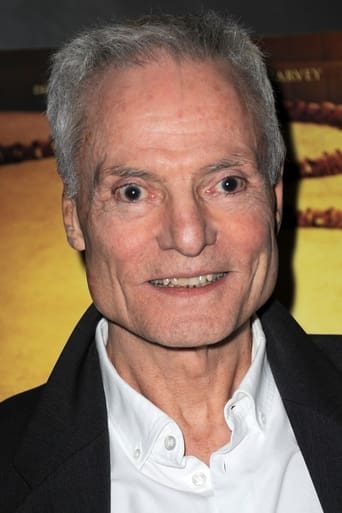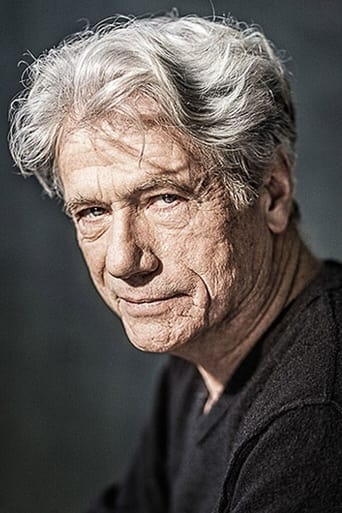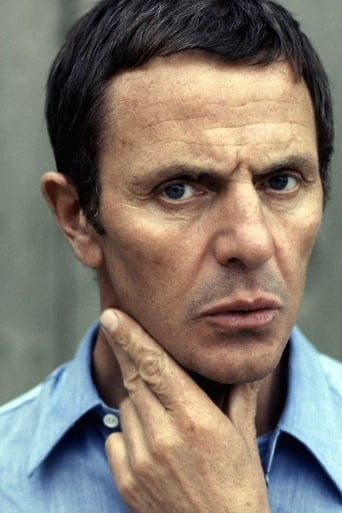CheerupSilver
Very Cool!!!
SpuffyWeb
Sadly Over-hyped
Platicsco
Good story, Not enough for a whole film
Sexyloutak
Absolutely the worst movie.
Lee Eisenberg
Grace Kelly once said: "There is freedom of the press, but not much freedom from it." "The Lost Honor of Katharina Blum" shows that to be all too true. Katharina Blum (Angela Winkler) is a young woman in West Germany who has a brief fling with a man who turns out to be a left-wing terrorist. The press, ever eager to find stories to sell, sensationalizes the whole thing to make Katharina look like a terrorist, destroying her reputation in the process.The movie also poses the question of quantity vs. quality. You may or may not have heard of Germany's economic miracle. Kaputt after WWII, Germany quickly rebuilt and went on to become Europe's largest economy. But what does it really mean? Katharina's apartment building looks pretty fancy on the outside, but her apartment looks kind of dilapidated; maybe the "economic miracle" has been a facade all along. Either way, this is a movie that everyone should see.
honeybearrecords
It's funny, but the recent Criterion DVD release of "The Lost Honor of Katharina Blum" gives it a whole new perspective. Next to "The Legend of Rita", "Lost Honor" is almost like "Rosencrantz and Guildenstern are Dead". But in this case, it's dead serious.Katharina Blum is a normal German woman who has a one-night state with a man she meets at a party. Later, she finds out that he is an anarchist and part of a Baader-Meinhoff-type gang; the group Rita from "Legend of Rita" is supposed to be a member of.Responding to the activities of German urban guerrillas, there is a national dragnet to hunt them down. Blum is arrested and gets caught up in the hunt, revealing a myopic government at it's most abusive. Equally revealing is the insidious nature of the media and it's role in repression. You can't help but get a chill watching it not because you can't believe it ever happened. But because you can't believe it happens all the time. Life in America is a lot like Katharina Blum's for many people.Schlöndorff is an intellectual. Both of these films are great reflections of that. They're smart, challenging while being well paced and lithe. "Lost Honor" marked the directorial debut of Margarethe Von Trotta (in some ways a protégé of Schlöndorff's not to mention lover) who would go on to great things including "Rosa Luxembourg".
Prof_Lostiswitz
Angela Winkler totally dominates this movie, and it could scarcely function without her acting skills. She is at once reserved and sensuous, in a way that suggests a deeply spiritual person. It comes as no surprise that her character was educated in a convent and is jokingly called "the nun" by her friends. Quite possibly she might have entered holy orders, and she still keeps up contact with the "Cloister" she remembers so fondly. Anyhow, Katharina is now a housemaid working for a kind lawyer and his wife, after a failed marriage to a dork. Somehow, though, she manages to have a fancy apartment and a Porsche, something that will cause her much grief later on. She gets invited to a party in progress by a bunch of her friends; she is reluctant to go, but finally accepts. This is during Carnival, similar to Halloween, so most people are dressed in outrageous costumes and partying wildly. The demure Katharina seems out of place here, until she meets a kind young man (not in costume) who treats her with tenderness and respect quite different from the boozers. It's love at first sight, Katharina is overwhelmed for the first time ever - love at first sight. They go off and spend the night in her apartment.SPOILERS The next morning all hell breaks loose, as a SWAT team bursts into her apartment looking for the guy, who by then is gone. We have known there's something odd about him, as we've seen him, at the beginning of the film, framed in the cross-hairs of a movie-camera (a brilliant touch reminiscent of Peeping Tom) and seen him throw off a pursuer in an exciting car chase. It turns out the police think he is a dangerous international terrorist; worse still, they think the pure and delicate Katharina is his long-standing accomplice in terror. She is now plunged into utter hell, not so much from the police interrogation (which is bad enough), but from the attentions of the gutter-press, which uses distortions and outright lies to destroy her reputation in the eyes of the gullible populace, with much co-operation from the police. (As she's being escorted to the police station, the cops grab her hair in order to make her face twist in pain, thus the press-photos get to show her as "vicious". END SPOILERS I am struck by how much this film resembles Town Without Pity (1961), which was also set in Germany, with Christine Kaufmann playing a role similar to Katharina Blum; it must surely have been a major influence on Schlondorff. Kafka's The Trial also comes to mind. Another influence must have been the paintings of James Ensor, eg "The Entry of Christ into Brussels", with its revellers in grotesque and frightening masks. Carnival is a major participant in the story, as the drunken revellers in strange costumes become something frightening when they turn into an accusatory mob, as they do upon seeing the now-dishonoured Katharina. Although the story chronicles the systematic destruction of a personality, there are some surprise twists (which I won't reveal). It should be said that Katharina imperceptibly metamorphoses from a terrified victim into somebody with a quiet determination to do what must be done. Angela Winkler is absolutely brilliant in the way she portrays this subtle change in her character, underplaying the drama and conveying her changing feelings with the minutest of facial expressions, which speak louder than sweeping gestures. I'll leave others to discuss the political implications of the movie, but you have to see it for one of the great acting performances of the century.
spyit
"The Lost Honor of..." not only tells an interesting story with powerful writing, acting and cinematography, but is also a must see for those disturbed by the powerauthoritarian governments (communist, fascist, and everything in between) possess to exploit individual human rights. I wish we could view this film as a well made relic of the past, but unfortunately its subject matter is as relevent today as it was in 1970's West Germany. As in Katarina's world, terrorism is again the favored epithet of the day as the U.S.'s social and political climate moves away from a conversation between differing individual view points and towards an 'on message' insistence on absolute conformity.Katarina is a young maid with little money, who sleeps with a man she barely knows, a man who is under surveillance as a suspected terrorist. Because she was seen with the supposed terrorist, her life is torn apart by police interrogators and a press that only reports "facts" which support its particular ideology, even if the details must be fabricated. Although those who know Katarina tell the press and police of a bright, sweet, and quiet girl, her reputation is run through the gutter by the men who translate her private life to the public world. Eventually, Katarina takes on the attributes of a stereotypical terrorist because the state has given her no choice but to become radicalized. Simply because Katarina will not give up her dignity and privacy, she becomes an enemy of the state.For Katarina, her private life becomes glaringly public, and the public judges her based on both the fabricated evidence presented by her accusers (both press and government) as well as their own assumptions about how a woman should behave. In the society that surrounds Katarina, the state functions through conformity, and those who do not conform instantly become the enemy. As a woman, Katarina bears the brunt of this brutality, as her sexuality becomes both exploited and demonized. The young maid becomes a media fixation, a beautiful sexual terrorist.Although much of this might sound familiar, the film relates these political and social paradoxes on an individual, personal level. As in Katarina's case, sensational news stories rarely investigate the cogs which make them front page headlines-they only reinforce easy reactions of judgemental outrage. "The Lost Honor of ..." shines a bright light on the lives that are trampled beneath the broad strokes of an unyielding and inhuman militarized state and the press and public which supports it.





